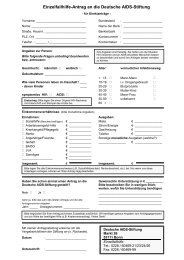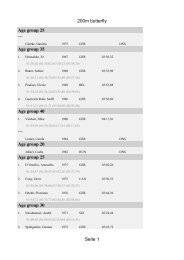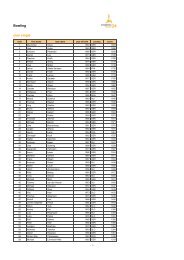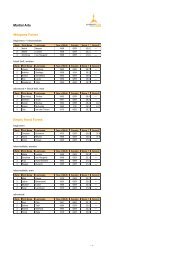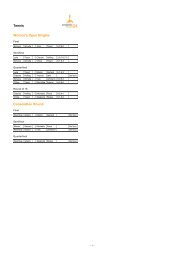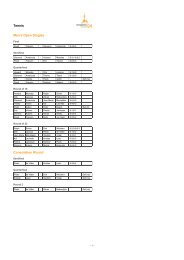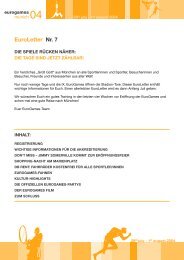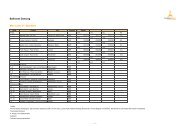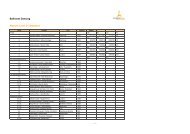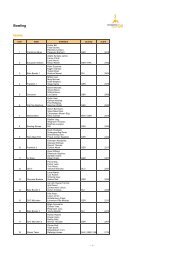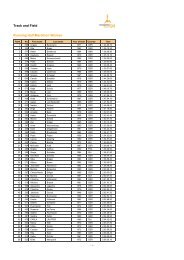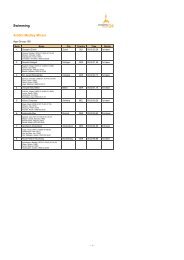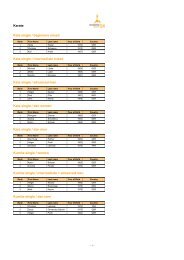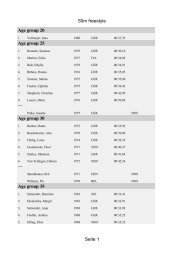EuroGames Munich - EuroGames 2004 München
EuroGames Munich - EuroGames 2004 München
EuroGames Munich - EuroGames 2004 München
Create successful ePaper yourself
Turn your PDF publications into a flip-book with our unique Google optimized e-Paper software.
The history of the <strong>EuroGames</strong><br />
The initial impact for Europe’s biggest lesbian-gay sport event came 12 years<br />
ago from the project cooperated between the EGLSF (European Gay and<br />
Lesbian Sport Federation), Amsterdam, and the GISAH (Gay Integration<br />
through Sports and Activities). The EGLSF is the license holder of the<br />
<strong>EuroGames</strong>. 100 sport clubs in 15 European countries belong to the EGLSF.<br />
The alliance works campaigns against the discrimination of lesbians and<br />
gays in sport.<br />
The Philosophy of the <strong>EuroGames</strong><br />
The initial idea of the <strong>EuroGames</strong> lives on till today: Lesbians, Gays,<br />
Bisexuals and Transgender from all over Europe meet to do sports together.<br />
Everybody is welcome independent from origin, sexual orientation, religious<br />
or political attitude. The <strong>EuroGames</strong> do not ghettoize minorities; they make<br />
them visible and therefore campaign for acceptance and tolerance towards<br />
homosexuals in sport. Especially lesbians and gays from south- or east<br />
European countries, where homosexuality is still a taboo or legally forbidden,<br />
have the opportunity to express themselves.<br />
1992 – How it all began<br />
1992 – The <strong>EuroGames</strong> were founded. At that time 300 women and men<br />
from 5 European countries were competing in The Hague, former seat of the<br />
EGLSF, in the disciplines Badminton, Football, Volleyball and Basketball.<br />
1993 – The Hague again<br />
1993 the number of participants nearly doubled with 540 athletes from eight<br />
European countries. The supply of sports was widened to six disciplines.<br />
Venue was again The Hague, because the city where the <strong>EuroGames</strong> should<br />
have taken place, took back their application and The Hague already had the<br />
necessary infrastructure.<br />
Blumenstraße 28<br />
D-80331 <strong>München</strong><br />
Postfach 33 07 02<br />
D-80067 <strong>München</strong><br />
+49 (0)89 59043-691<br />
+49 (0)89 59043-690<br />
www.eurogames.info/<strong>2004</strong><br />
press<br />
@eurogames.info<br />
Christine Gundlach<br />
Press Spokeswoman<br />
+49 (0)179 531 35 42<br />
christine.gundlach<br />
@eurogames.info<br />
Sascha C. Falk Mrotzek<br />
Press Spokesman<br />
+49 (0)172 854 25 12<br />
sascha.mrotzek<br />
@eurogames.info<br />
Press Center<br />
29th July – 1st August<br />
Olympiapark <strong>München</strong><br />
Spiridon-Louis-Ring 21<br />
80809 <strong>München</strong><br />
+49 (0)89 3067-3650<br />
+49 (0)89 3067-3651<br />
+49 (0)89 3067-3652<br />
press<br />
@eurogames.info<br />
Office<br />
Postal<br />
address<br />
Tel<br />
Fax<br />
Web<br />
e.Mail<br />
Contact<br />
Department<br />
Mobile Phone<br />
e.Mail<br />
Contact<br />
Department<br />
Mobile Phone<br />
e.Mail<br />
Contact<br />
Postal<br />
address<br />
Tel<br />
Tel<br />
Fax<br />
e.Mail



